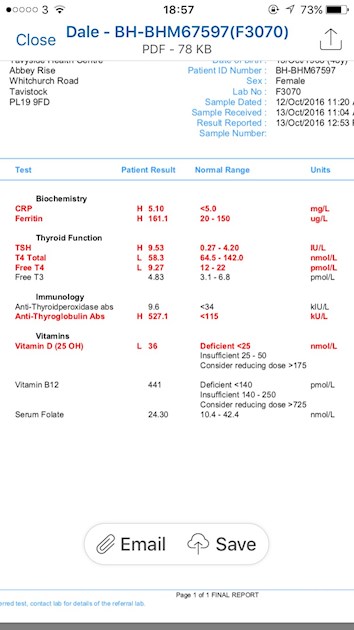I have just received my blood results very quick service it went in the post yesterday and I have just received the results.
I only started taking the levothyroxine today 50mcg
I also taking HRT Elleste solo 2mg a day
Venlaflaxine 37.5 mg a day.
I am getting slightly worried about all of this now....
Hoping you guys can help me understand this.
This is the Doctors comments below...
The combination of low TSH and free T4 levels, with a normal T3 level, would be unsurprising if you are taking T3 form of thyroxine - is this the case? If so, it might be a good idea to discuss your ongoing thyroid medication dose requirement with your usual doctor. If not, and you were unaware of any thyroid problem, the low TSH level might indicate a developing hyperthyroid (overactive thyroid) state, or (with the low free T4 level too) even pituitary gland underactivity. Again, discussion with your doctor would be wise if this is the case. The finding of a positive thyroid antibody result in addition increases the possibility of your having autoimmune thyroid disease, such as Hashimoto's thyroiditis or Grave's disease.
A high CRP (C reactive protein) is associated with inflammation from some cause (as seen for example with arthritis or infection). It is not an exact test, and it is nonspecific. An elevated CRP is not a normal finding and its presence should lead to further investigation to establish the cause. If you have any symptoms suggesting either infection (fever, cough, painful urination etc.) or inflammation (swollen painful joints for example), I advise you to contact your usual doctor. In any event, it would be sensible to repeat this test around 4-6 weeks’ time and if persistently elevated it would be sensible to discuss this finding with your doctor.
The ferritin level is also high. In addition to excess iron supplementation, raised serum ferritin can be a sign of inflammation or infection - which, considering the elevated CRP, is possible here. Raised ferritin due to inflammation is not a sign of too much iron, and is not a sign of disease as such. Less commonly, higher ferritin levels can result from damage to bone marrow or liver, genetic conditions, following blood transfusion, and in chronic anaemias such as thalassaemia. Repeat testing in a few weeks’ time will enable you to spot any trends if you wish to be sure the levels are not persisting or rising - but of course you may wish to speak to your usual doctor first.
There is Vitamin D insufficiency. Vitamin D is manufactured in our skin as a direct result of sunlight exposure. One potential complication of prolonged Vitamin D lack is osteomalacia, a disease which causes severe structural deformities to the skeleton. Lower level Vitamin D deficiency can lead to a number of nonspecific symptoms, including possibly chronic fatigue (experts have for many years noted an association between sufferers of chronic fatigue syndrome or myalgic encephalitis (CFS or ME) and low blood levels of Vitamin D). It has been estimated that between 50-70% of people living in the northern Europe (where daylight length reduces your chances of receiving adequate sunlight in the winter) are deficient in this vitamin by March each year. Symptoms of vitamin D deficiency include chronic pain, weak bones, frequent infections (recent research has detected an association between vitamin D deficiency and severe pneumonia), depression and fatigue. Supplementation may be beneficial - please speak to your usual doctor about this result.

